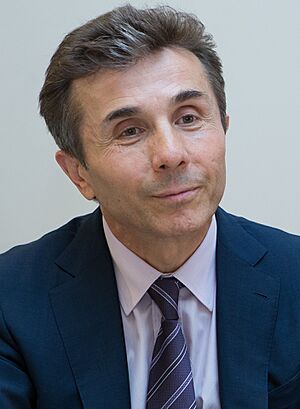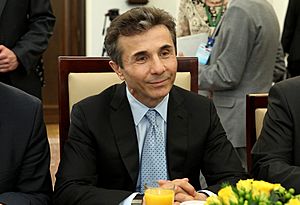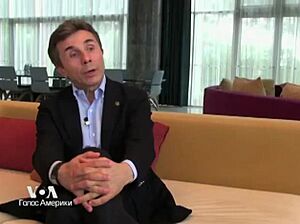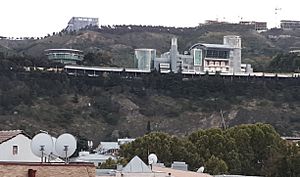Bidzina Ivanishvili facts for kids
Quick facts for kids
Bidzina Ivanishvili
|
|
|---|---|
|
ბიძინა ივანიშვილი
|
|

Ivanishvili in 2013
|
|
| 10th Prime Minister of Georgia | |
| In office 25 October 2012 – 20 November 2013 |
|
| President | |
| Preceded by | Vano Merabishvili |
| Succeeded by | Irakli Garibashvili |
| Chairman of Georgian Dream | |
| In office 12 April 2012 – 15 November 2013 |
|
| Preceded by | Position established |
| Succeeded by | Irakli Garibashvili |
| In office 26 April 2018 – 11 January 2021 |
|
| Preceded by | Giorgi Kvirikashvili |
| Succeeded by | Irakli Kobakhidze |
| Honorary Chairman of Georgian Dream | |
| Assumed office 30 December 2023 |
|
| Preceded by | Position established |
| Personal details | |
| Born | 18 February 1956 Chorvila, Georgian SSR, Soviet Union |
| Citizenship |
|
| Political party | Georgian Dream (2012–2013, 2018–2021, 2023–present) |
| Spouse |
Ekaterine Khvedelidze
(m. 1991) |
| Children | 4, including Bera |
| Alma mater |
|
| Awards | Legion of Honour |
| Net worth | US$7.27 billion (2024) |
| Signature |  |
Bidzina Ivanishvili (born 18 February 1956) is a Georgian businessman, politician, and billionaire. He is a very wealthy and powerful person, sometimes called an oligarch. He founded and leads the Georgian Dream party, which has been the ruling party in Georgia since 2012.
Ivanishvili is the richest person in Georgia. His wealth in 2024 was estimated at $7.6 billion. This amount is equal to about a quarter of Georgia's entire economy for 2023. He made his fortune in Russia during the 1990s after the Soviet Union ended. He started by selling computers and later bought large banking and metal companies.
He entered Georgian politics in 2012, creating the Georgian Dream party. His party won the election that year. He served as Prime Minister from 2012 to 2013. After his term, he said he was leaving politics. However, many people believe he continued to be the most powerful person in Georgia's government from behind the scenes. He has returned to lead his party several times since then.
Contents
Early Life and School
Bidzina Ivanishvili was born in a small village called Chorvila in Georgia. He was the youngest of five children in a poor family. His father worked in a factory. Growing up, his family did not have much money, and he didn't even have shoes. This background later helped him connect with many voters in Georgia.
He finished high school in the town of Sachkhere. In 1980, he graduated from Tbilisi State University with a degree in engineering and economics. Later, he moved to Moscow to study for a PhD in economics.
Business Career
In the late 1980s, Ivanishvili started his own business. This was unusual at the time because private companies were new in the Soviet Union. He and a partner, Vitaly Malkin, began selling computers and push-button telephones in Moscow.
They became very successful. When the Soviet Union broke apart, the Russian government sold many state-owned companies. Ivanishvili and his partner used their money to buy businesses in the metal and banking industries. These businesses became the source of his great wealth. In 2002, he left Russia and moved to France.
Entering Georgian Politics
After returning to Georgia in 2003, Ivanishvili became known for his charity work. He gave money to build the famous Sameba Cathedral in Tbilisi, the largest church in Georgia. He also helped pay for reforms to the police and for building new roads and buildings after the Rose Revolution.
In 2011, Ivanishvili announced he would enter politics. He wanted to challenge the government of President Mikheil Saakashvili. He said he would sell his businesses in Russia and give up his Russian and French citizenships.
Soon after his announcement, the Georgian government took away his Georgian citizenship. A court later confirmed this decision. However, his wife, who also had her citizenship questioned, was allowed to keep hers.
The 2012 Election
In 2012, Ivanishvili formed a political coalition called Georgian Dream. The group included several different parties that all wanted to defeat the ruling party. The name "Georgian Dream" was inspired by a rap song by his son, Bera.
The Georgian Dream coalition promised to improve healthcare and education, lower taxes for the poor, and fix relations with Russia. They also wanted to strengthen ties with the European Union and NATO.
During the election campaign, Ivanishvili's great wealth was a major topic. He was fined for breaking rules about how much money can be given to a political party. His lawyers said the fines were politically motivated.
In the October 2012 parliamentary election, the Georgian Dream coalition won with nearly 55% of the vote. This was a historic moment because it was the first time in modern Georgia that power was transferred peacefully after an election.
Prime Minister of Georgia (2012–2013)
Ivanishvili became Prime Minister of Georgia on October 25, 2012. His government made several important changes.
One of the biggest was the Universal Healthcare Program. This program gave state-funded health insurance to millions of Georgians. The government also increased money for pensions, social aid, and education.
His government also reformed the prison system. Before he took office, there were reports of bad conditions in prisons. The new government passed a law that released many prisoners and improved prison conditions.
Foreign Policy
Under Ivanishvili, Georgia worked to get closer to the European Union. He made his first official trip as Prime Minister to Brussels, the EU's headquarters. Georgia and the EU began talks about allowing Georgians to travel to EU countries without a visa.
Relations with Russia also improved. For the first time since the 2008 war, officials from both countries met for talks. In 2013, Russia ended its ban on Georgian wine, which was a big help to Georgia's economy. However, Georgia continued to seek closer ties with the West.
Leaving and Returning to Politics
In November 2013, after only a year as Prime Minister, Ivanishvili resigned. He said he wanted to work in the non-profit sector. His interior minister, Irakli Garibashvili, took his place.
Even though he officially left politics, many people believed Ivanishvili was still in charge behind the scenes. His political opponents accused him of controlling the government without holding an official position. Many high-ranking officials appointed after 2013 had previously worked for his companies.
In 2018, Ivanishvili officially returned to politics and was re-elected as chairman of the Georgian Dream party. He said he came back to keep the party united.
In January 2021, he announced he was leaving politics for good, saying he had "accomplished his goal." But in December 2023, he returned once again. He became the "honorary chairman" of the Georgian Dream party, a new position created for him.
Political Ideas
Bidzina Ivanishvili has said he supports Georgia joining the European Union and NATO. He believes this is important for the country's future. He has also said that having a good relationship with the United States is a top priority.
At the same time, he has worked to improve relations with Russia. He believes that better economic and cultural ties with Russia can help Georgia's economy and reduce the risk of conflict.
Ivanishvili has also spoken about Georgia's conflicts over the regions of Abkhazia and South Ossetia. He believes that Georgia should be an attractive, democratic country for the people living there. He supports peaceful talks to solve these issues.
In recent years, some of his views have been described as critical of the West. He has talked about a "global war party" that he claims is trying to cause trouble in Georgia. He has also used his influence to support socially conservative ideas.
Wealth and Personal Life
According to Forbes magazine, Ivanishvili's net worth in 2024 was about $6.4 billion, making him the richest person in Georgia. His wealth is so large that it is equal to about one-third of Georgia's entire economy.
He is a well-known art collector and once bought a painting by Pablo Picasso. He also bought a famous painting by Georgian artist Niko Pirosmani and donated it to a museum in Georgia.
Ivanishvili and his wife, Ekaterine Khvedelidze, started the Cartu International Charity Foundation. The foundation has given money to many projects in Georgia, including art, sports, and building repairs.
Family and Home
Ivanishvili is married and has four children. His son, Bera, is a famous singer and rapper in Georgia.
He owns several homes, including a futuristic-looking mansion made of glass and steel on a hill overlooking Tbilisi. The house is estimated to be worth $50 million.
He is also known for his interest in collecting rare trees and exotic animals. He created a large park on the Black Sea coast called the Shekvetili Dendrological Park. It has hundreds of types of trees from around the world and many exotic birds. Moving huge, old trees to the park has caused some controversy with environmental groups.
See also
 In Spanish: Bidzina Ivanishvili para niños
In Spanish: Bidzina Ivanishvili para niños
- List of Legion of Honour recipients by name (I)
- Legion of Honour Museum
 | James B. Knighten |
 | Azellia White |
 | Willa Brown |




